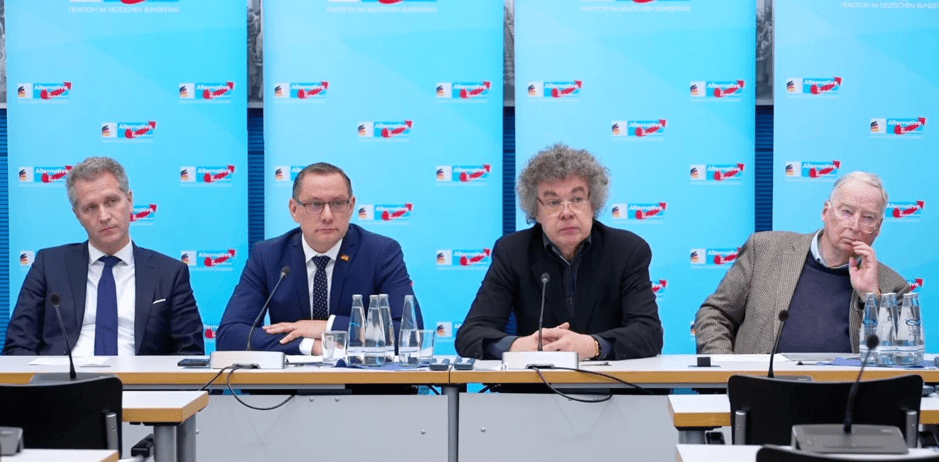
AfD Faction Leadership Press Conference on ‘Peace Plan’: Petr Bystron, Tino Chrupalla, Matthias Moosdorf, and Alexander Gauland
The de-escalatory, anti-war position taken by the Alternative für Deutschland (AfD) party appears to have struck a chord with the German population. The latest opinion survey revealed that the party’s support has climbed to a record high, surpassing that of the hawkish Green party led by Foreign Minister Annalena Baerbock.
The poll, conducted by the UK international market research and data analytics firm YouGov, indicated that if the vote were held today, the AfD would become the third-largest party with 17% of the national vote. AfD now ranks third in popularity, behind the front-runner CDU/CSU (27%), and Chancellor Scholz’s SPD (19%), which has witnessed its support decline precipitously in the year following the onset of the Russo-Ukrainian war.
In Germany, the AfD hit 17% in a poll for the first time in years pic.twitter.com/ZjOw2cbe23
— Populism Updates (@PopulismUpdates) February 10, 2023
Meanwhile, the latest polling data showed nationwide support for the liberal Free Democrats Party (FDP), the most junior member of the ‘traffic light’ coalition, has continued to nosedive, sinking to an all-time low of 6%. The Greens, for their part, have seen their support remain relatively constant—fluctuating between 16% and 18%—over the past couple of opinion surveys.
The surge in the AfD’s polling numbers, published on Friday, February 10th, was revealed one day after the party presented its peace plan for Ukraine in the Bundestag.
For MP Petr Bystron, who serves as the AfD’s foreign policy expert, the sharp rise in support for the AfD is a clear indication that the party’s anti-war, de-escalatory position on the Russo-Ukrainian war—which no other political force represented in the Bundestag has taken—is one that genuinely reflects the will of an increasing number of Germans.
Speaking exclusively to The European Conservative about the AfD’s record high support and how it relates to the party’s anti-war stance, MP Petr Bystron had this to say:
Popular support for the AfD is rising because we are the only political party fighting for peace in Ukraine. All of the other parties are pro-war and they are all in favor of continued, escalating arms shipments. We are the strongest peace party. It is not a coincidence that one day after our unveiling of the peace initiative we jumped over the Greens, who are the number one war party. This shows what the people in Germany really want.
Before presenting the motion to the chamber, the party declared it is “high time that the federal government remembered Germany’s responsibility for peace in Europe and finally acted more actively for the end of hostilities and for peace.”
The AfD also lamented that under the leadership of Chancellor Olaf Scholz and the left-liberal traffic light coalition, Germany has all but given up its role “as a neutral mediator in international conflicts and has passed on the costs to the uninvolved German people, who are now confronted with price increases and an uncertain energy supply.”
“A first step would be to link the political, military, and financial support of Ukraine to Kyiv’s willingness to negotiate serious peace talks and also to demand a willingness to talk to Russia,” the AfD put forward in the motion.
The party urged the federal government to “emphatically support the sending of an international peace delegation led by a representative of the Organization for Security and Co-operation in Europe (OSCE) to Kyiv and Moscow and to agree on an immediate ceasefire with both sides.”
Additionally, as a part of its peace plan, AfD lawmakers have called for, among other things, the “gradual withdrawal of Russian armed forces from Ukrainian state territory to the level before February 24, 2022, with a gradual reduction in military support to Ukraine from EU member states, the UK and the U.S., and the gradual lifting of sanctions against the Russian Federation.”
The AfD proposed that Ukraine should ultimately have a privileged EU partnership—one that is similar to the EU-Turkish model—“under the condition that Ukraine does not become a NATO or EU member. In addition, no nuclear weapons should be stored, missiles or foreign troops should be stationed on the territory of Ukraine.”
As The European Conservative previously reported last October, the AfD is the strongest political force in East Germany. AfD co-leader Alice Weidel thinks it is “absolutely realistic” to participate in the state governments of Brandenburg, Thuringia, and Saxony following the states’ parliamentary elections next year.
